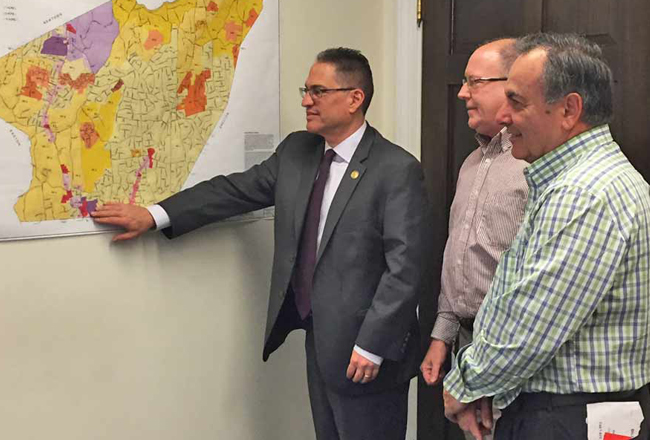
The town of Monroe has been overshadowed over the past few years by neighboring Trumbull, where construction is booming to its south, and Danbury, making strides at redeveloping its downtown a few miles to the northwest.
But Monroe First Selectman Ken Kellogg, who took office last year, says that is beginning to change.
“We”™re sending the message that we”™re open for business, we”™re easy to work with and we”™re willing to change some things to build a better community,” he said.
With a population of roughly 20,000, Monroe is in some ways still a rural community. “Our residential districts are all still called ”˜residential and farming districts,”™ ” Kellogg noted.
“We have a lot of land zoned for business and industry,” he said. “And we”™re starting to get interest in some of those long-vacant properties.”
Kellogg said he believed he has been able to bring “a fresh look at things.”
This includes working with the Connecticut Metropolitan Council of Governments (MetroCOG), a cooperative partnership between Monroe, Bridgeport, Easton, Fairfield, Stratford and Trumbull, to modernize interacting with the town by shifting much of the workflow online, to relaxing requirements for developers looking to make minor adjustments to plans “like moving an AC unit from here to there,” Kellogg said.
Monroe will also allow restaurants of 50 seats or fewer to apply for liquor licenses, something that had not been permitted before. “That”™s one of those laws that had been there forever, probably a holdover from old blue laws,” Kellogg remarked.
There have also been key hires: Rick Schultz, who last year resigned from his post as Shelton Planning and Zoning Administrator after 22 years to become Monroe”™s town planner; and Ray Giovanni, head of the Chamber of Commerce, who last year was appointed chair of the Economic Development Commission.
Schultz said he was drawn to Monroe by the opportunity to work with another small, more agricultural-based community. “I”™ve always enjoyed working with small businesses,” he said, noting that he had not met Kellogg before applying for the job.
Giovanni said he knew Kellogg only slightly before being invited to head the Economic Development Commission. “We all agree that we want to make progress,” he said, “but in a way that”™s respectful to our residents. We”™re not going to be ”˜go, go, go”™ and bust everything open. We do not want to interfere with what people know and expect while developing our strategic process.”
Last year saw Kellogg form the First Selectman”™s Business & Industry Advisory Committee, which includes representatives from various sectors of the business community alongside relevant government officials. Schultz said the group convenes roughly every six weeks or so “as we have so many balls in the air now.”
One of the first major developments is The Shoppes at Victoria Place, a “village-style shopping center” proposed for about 15 acres on the corner of Main Street and Victoria Drive. The project will include six buildings totaling 115,000 square feet, each with a unique façade, and offer a mix of restaurants and retail stores featuring national brands.
Kellogg credited Monroe resident and developer Robert Dunbar, who will submit a comprehensive plan and formal application to the town”™s Planning and Zoning Commission “in the near future,” with “raising the bar on development in a way that Monroe hasn”™t experienced in the past.”
Still at issue is the future of the old Stevenson Lumber property at 1585 Monroe Turnpike, a 43-acre site that has been vacant since 2008. Various projects have been floated for all or part of that space over the years, and while Kellogg said there has been some interest expressed by developers he declined to name, no announcements are expected soon. Stevenson accounted for $24,000 in annual property taxes and 300 jobs before its exit.
Schultz noted that the town is working with Trumbull to develop certain properties that straddle their common border.
Monroe”™s reliance on septic tanks could be a detriment to drawing larger companies to the town.
Kellogg is including in Monroe”™s next budget a RFP to have some funds set aside for a sewer-system feasibility study. While any sewer installations would likely be limited to Routes 111 and 25, and possibly along Pepper Street ”” where Town Hall is located ”” Kellogg said the costs, including a sewer tax for residents, would decide the long-debated issue.
“We”™ve been talking about it for decades,” he said. “What I want to do is explore the possibilities and put it before the town. We don”™t know what we”™re looking at until we ask the right questions.”
It is unknown if Walmart”™s plan to open a Supercenter on three and a half acres on the southeast corner of Victoria Drive and Main Street was dealt a death blow by the sewer question. The company announced in 2017 that it would not proceed after several years of wrangling with the town”™s approval and permitting processes.
Walmart is in Monroe”™s rear-view mirror, Kellogg said.
The town remains hopeful that it could be home to an indoor ice-skating rink, the dearth of which in the area has led to skaters traveling to Shelton or Danbury. “Some of our high schoolers are going to Shelton at 5:30 in the morning to get ice time,” Giovanni said.






















